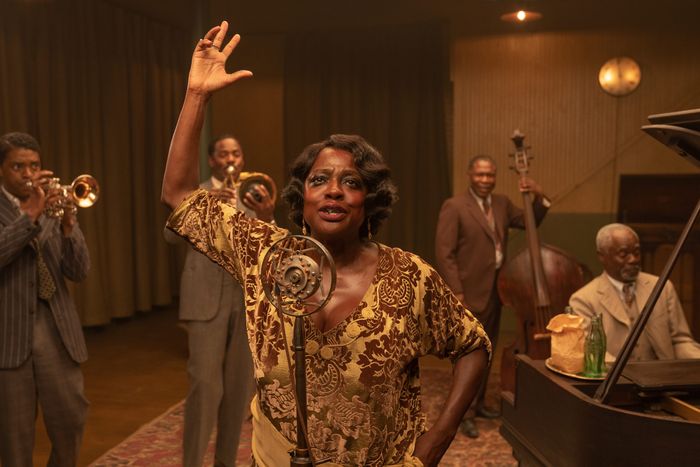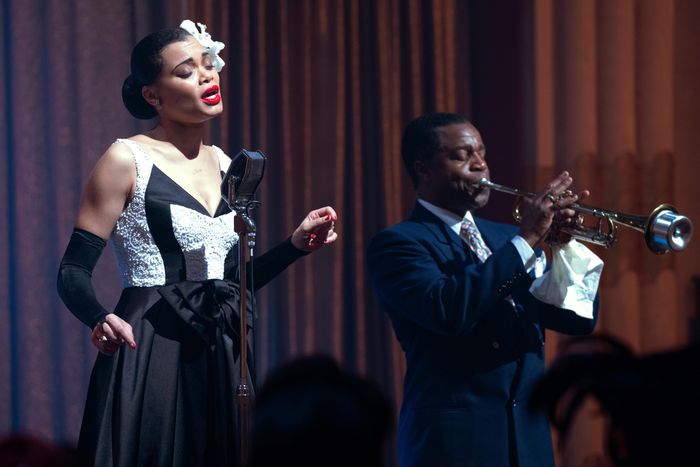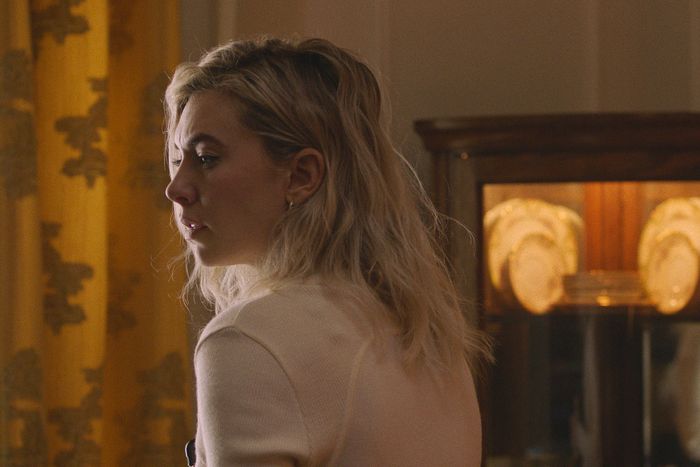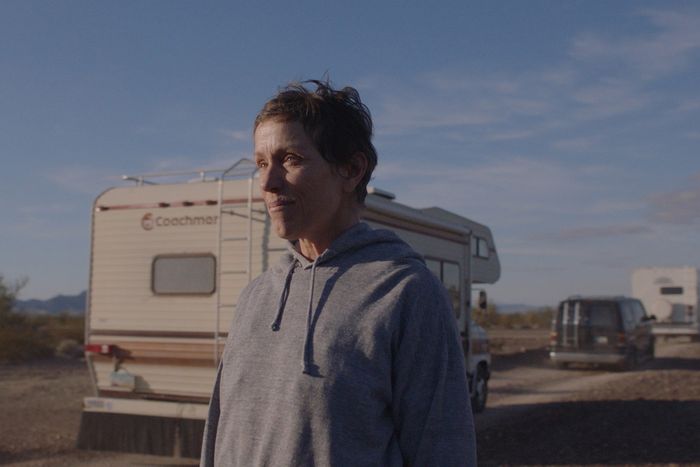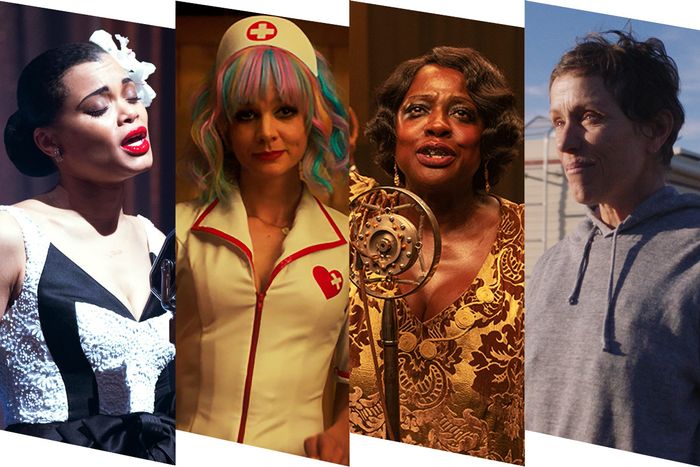
Who’s in front in the Oscars’ Best Actress race? Who knows!
In most seasons, the race had been narrowed down by this point. Either there’s one front-runner steamrolling all comers (Renée Zellweger last year), or there’s a pair of contenders who duke it out down the stretch (Glenn Close leading all season, only to be usurped by Olivia Colman at her moment of glory).
But this year, the preliminary results have given us only chaos. The Critics’ Choice Awards went with Carey Mulligan, the Golden Globes sprang for Andra Day, and SAG chose to reward Viola Davis. You’d naturally expect whichever of them triumphs at this weekend’s BAFTAs to thus become the front-runner, but nope — all three were snubbed by the Brits, ensuring Oscars Night will arrive with each precursor having named a different Best Actress winner.
The result is a category that, with three weeks to go before the big night, still feels thrillingly uncertain. Will voters go with a veteran or a new face? Will they reward the star of a beloved Best Picture nominee, or spotlight a performance a little further afield? Will they reward the one that fits the traditional idea of an Oscar winner — and if so, which definition is that, exactly? Look at it one way, and you can find a case for almost all of the nominees to be the front-runner. Look another way, and you’ll find a rock-solid reason why each of them would never win. Here’s a rundown of the five contenders. Which one has your vote?
Viola Davis, Ma Rainey’s Black Bottom
The role: Ma Rainey, an alcoholic blues singer whose domineering temper is revealed as her only way of asserting control in a white-dominated industry.
The season so far: Won Best Actress at the SAG Awards, snubbed at BAFTA.
In her favor: They say you should never bet against a transformation, and this August Wilson adaptation allows Davis to throw off the capable, tightly wound characters she often plays to go bigger and messier than ever before. Her peers seem to appreciate the range: That SAG win was the fifth of Davis’s career, and her reputation as an actor’s actor should provide her with a strong base within the Academy’s largest branch. While Davis does already have an Oscar, her win for Fences came (somewhat controversially) in the Supporting category. As one of the most acclaimed actresses of her generation, she’s surely due a Best Actress trophy sooner or later. Why not now, when she’d make for a historic pairing alongside her late co-star, presumptive Best Actor winner Chadwick Boseman?
Working against her: While the run-up to Davis’s first Oscar was marked by charges that her character had too much screen time to compete in Supporting Actress, the reverse is true this year. While no one would call Ma Rainey a supporting character — it’s the titular role! — she does take a back seat at points to Boseman’s character, which could hurt Davis in a field where her fellow nominees all remain steadfastly at the center of their films’ narratives. And how much love’s out there for the film as a whole remains a mystery: If Ma Rainey was really going to win Best Actor and Best Actress, shouldn’t it have been strong enough to earn a Best Picture nomination?
Andra Day, The United States vs. Billie Holiday
The role: Jazz singer Billie Holiday, who was persecuted by the FBI over her refusal to stop performing the anti-lynching anthem “Strange Fruit.”
The season so far: Won the Golden Globe for Best Actress in a Drama, snubbed at SAG and BAFTA.
In her favor: What do you think of when you picture a Best Actress winner? Perhaps, like Olivia Colman, she is playing a real person. Possibly a legendary figure in the entertainment industry, possibly someone who struggled with drug addiction — or possibly both, like Renée Zellweger. Like Julianne Moore and Cate Blanchett, her role probably calls for her to have a series of excruciating emotional breakdowns. Her film’s themes might have a timely political resonance, like Frances McDormand. She might also be an exciting new face in a breakthrough performance, like Brie Larson, and she might sing, like Emma Stone. Or maybe, like Andra Day in The United States vs. Billie Holiday, she checks all of those boxes and more. Writer/director Lee Daniels all but served the nomination up on a plate for his leading lady, but it’s worth noting that Day, an R&B singer in her first lead role, would not have gotten this far if she hadn’t delivered a knockout performance.
Working against her: The United States vs. Billie Holiday debuted late in the season to mediocre reviews and muted buzz, and Day is the film’s sole nomination. While previous winners like Moore and Zellweger triumphed in similar circumstances, both of them were established veterans working a “she’s overdue” narrative. Day’s “breakout debut” narrative is equally potent, but while the Academy loves to use this category to anoint the next big star, that usually only works when a performer is fully committed to movies. Is Day? We’ve seen multi-hyphenates like Lady Gaga get dinged by Oscar for treating acting as an extracurricular, and the same factor could come into play here.
Vanessa Kirby, Pieces of a Woman
The role: Martha, a mother whose life is upended after a home birth ends in tragedy.
The season so far: Showed up everywhere, but her only major prize remains the Best Actress award at the Venice Film Festival.
In her favor: Kirby gives one of this season’s showstopping feats of acting: an unbroken 30-minute birth scene that’s the antithesis of the sanitized experience usually seen onscreen. It’s a raw, almost animalistic sequence, and it instantly catapulted the Crown alum into the Oscars conversation last September. She’s managed to hold her place through the ups and downs of the season, and as one of only two Oscars nominees competing at the BAFTAs, the London-born actress seems the favorite there. If Kirby does pull off the win at the final televised precursor, might she convince voters to take a second look?
Working against her: Apart from that opening sequence, people haven’t really been raving about the rest of Pieces of a Woman, and the fact that Kirby’s co-star Ellen Burstyn never cracked a major Supporting Actress lineup likely indicates a surfeit of passion for the domestic drama. For a burgeoning star like Kirby, this feels like a situation where the nomination itself is the win.
Frances McDormand, Nomadland
The role: Fern, a modern-day Nomad who traverses the American West in her van, often but not exclusively at magic hour.
The season so far: Nominated at all the precursors, but no wins outside of a handful of critics’ groups.
In her favor: Nomadland is the odds-on Best Picture favorite, and McDormand didn’t just act in it; she put the whole project together, optioning Jessica Bruder’s book and approaching Chloé Zhao to direct. Onscreen, the film rests entirely on her shoulders: McDormand is alone for long stretches of the movie, and when she does interact with people, they’re almost exclusively nonprofessionals playing themselves. If Nomadland is the film of the year — and many in Hollywood seem to agree it is — why not reward the woman who made it all possible?
Working against her: One of the ironic twists of this awards season is that Nomadland, a movie about people with few material possessions, looks on track to take home an armful of Oscars later this month. Director is a near certainty, and Picture and Screenplay are in play, too. The Academy likes to spread the wealth, and since Nomadland’s already going to win so much, this category feels like an easy place to spotlight someone else. Besides, voters can rest assured they won’t be disrespecting McDormand if they do indeed look elsewhere: She won her second Oscar just a few years ago, and will probably get a third later that night when Nomadland wins Best Picture.
Carey Mulligan, Promising Young Woman
The role: Cassie, an aimless 30-something who spends her nights getting revenge for her late friend’s rape: She pretends to be drunk, then confronts the “nice guys” who target her.
The season so far: Won Best Actress at the Critics’ Choice Awards, but was a surprising snub at BAFTA.
In her favor: In theory, all the dominoes have been set up for Mulligan to dominate the season. She’s the lead role in a buzzy Best Picture contender, giving a performance most viewers agree grounds the project’s tricky tone. Two of her rivals are past winners, while the other two have no Oscars track record to speak of. And she’s got that awards-season X factor, the synchronal interplay between star narrative and film narrative: Mulligan too was a promising young woman who gave years of her life over to a quixotic cause (in her case, laboring in unheralded period pieces), but now might be ready to try something new (a movie that’s lighter, funnier, and more modern). With Promising Young Woman looking due for at least one Oscar, slotting in Mulligan here feels like a natural choice.
Working against her: And yet, with seemingly everything going for her, why hasn’t Mulligan won anything but Critics’ Choice? If she does ultimately emerge triumphant, she’d be the first Oscar Best Actress winner to blank at the Globes, SAG, and BAFTA*. Promising Young Woman clearly has a lot of support within the Academy — it’s the only film besides Nomadland to be nominated in every key category — but with Emerald Fennell’s script gaining traction in the Original Screenplay race, it’s possible that voters will choose that category as the place to give it some love, instead.
*This post originally misstated Hilary Swank’s precursor track record.



